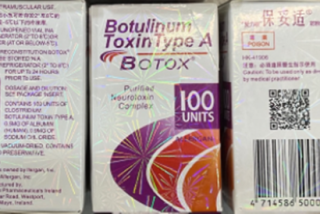U.S. Investigating Allergan Drug Export
- Share via
Allergan Inc. disclosed that it is under investigation by the Commerce Department for exporting a medicine made from a lethal toxin that can be used in biological warfare.
The department is investigating whether the Irvine-based company exported botulinum toxin without a license, the Irvine-based eye-products company disclosed in a recent filing with the Securities and Exchange Commission. The substance, generally associated with food poisoning, can be fatal and is internationally controlled because of its possible warfare uses. Allergan’s drug Botox, made from a purified form of botulinum, is an approved treatment for relaxing severely contracted eye muscles.
The Commerce Department requires exporters of such substances to obtain a special “validated” license. Companies applying for a validated license must submit information regarding the item being exported, its uses and recipients.
Allergan said that for a 15-month period it sold Botox abroad in many countries on a general export license, rather than a validated one, said spokesman Jeff D’Eliscu. The company, which has since obtained the license, contends that a federal law exempts medicines from the requirement, D’Eliscu said.
D’Eliscu said the active ingredient in Botox--botulinum toxin--is in the form of a vacuum-dried powder that can’t be made into a weapon. Physicians mix it with saline solution, then inject it into the muscle.
“You can’t use it for anything other than for injecting it into muscles for temporary relaxation of that cramping or muscle” spasms, he said.
A Commerce Department spokesman would not comment on the investigation.
After its initial inquiry, the department referred the matter early last year to the U.S. attorney for possible criminal charges, the company disclosed in its SEC filing. The U.S. attorney’s office, which did not file charges, returned the matter to the Commerce Department for “its evaluation of possible civil liability,” the filing states.
The department would not disclose how many drug companies have run afoul of its licensing controls. But one legal expert in the field said that such action by the Commerce Department relating to toxins is rare.
Civil penalties range from minimal to up to $100,000 per violation. In severe cases, a company’s exporting license can be revoked.
Allergan said in its securities filing that it does not expect potential liability to affect its financial position.
In October 1993, the company disclosed to the Commerce Department’s office of export enforcement that it had been shipping the drug under a general license since June 15, 1992, when the agency began requiring a special license for botulinum toxin.
The Australia Group, a 28-nation organization that works to stem proliferation of biological and chemical weapons, has included the toxin on a list of products that could contribute to biological warfare.
Allergan has been selling the drug since 1989, when it acquired the rights to it from its inventor, a California physician, D’Eliscu said. It has been exporting the toxin since the early 1990s, he said.
Last year, Botox accounted for $48.9 million of Allergan’s world-wide sales, up from $35.5 million the year before. Domestic sales made up about two-thirds of the total.
Allergan shares eased 12.5 cents to $34.625 on the New York Stock Exchange.
More to Read
Inside the business of entertainment
The Wide Shot brings you news, analysis and insights on everything from streaming wars to production — and what it all means for the future.
You may occasionally receive promotional content from the Los Angeles Times.









